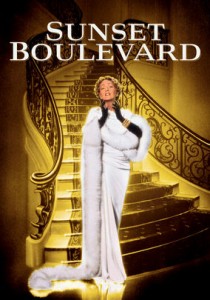Sunset Boulevard-1950
Director Billy Wilder
Starring Gloria Swanson, William Holden
Top 250 Films #101
Scott’s Review #330
Reviewed January 8, 2016
Grade: A
I adore films about Hollywood (good ones), and Sunset Boulevard (1950) is an absolute treasure.
Directed by classic film director Billy Wilder, the film is a film noir about a legendary silent film star, Norma Desmond, who struggles to cope with the advent of sound movies and the instability of her life, plagued by mental illness as her career has long since ended.
Handsome Joe innocently stumbles upon her mansion, forming an eerie relationship that ends in tragedy.
Sunset Boulevard is a famous street in Los Angeles and Beverly Hills, California. It is immediately featured in the film as Joe Gillis, played by William Holden, drives down the street, an unsuccessful screenwriter whose car is about to be repossessed.
Joe narrates the film, and we see a man lying dead in a vast swimming pool. Ironically, this is the film’s ending, and Wilder works backward in an interesting way, so the audience knows tragedy will eventually ensue.
To avoid being chased by men, Joe pulls into a driveway and hides his car in a garage near a vast yet run-down mansion. He is mistaken for a coffin salesman and meets the infamous and creepy Norma and her servant, Max.
The coffin is for Norma’s deceased pet chimpanzee. Intrigued and broke, Joe hatches a plot to rewrite Norma’s terrible screenplay- and make some money from the aging Hollywood star.
Norma needs companionship. The two, along with Max, embark on a complicated relationship marked by jealousy, passion, and rage.
The black-and-white style works exceptionally well in the film, and the lighting creates a sense of intrigue and film noir mystique.
Sunset Boulevard combines noir with a rich character study of Norma, and we feel her pain and isolation as she is cast aside due to the times.
I love how Wilder focuses on the gloomy nature of Norma’s vast mansion—especially when she throws a New Year’s Eve party isolated with just her, Joe, and a hired band—and intersperses it with a lively party in Hollywood filled with young, energetic, up-and-coming talents.
The scenes blend seamlessly and effectively showcase the two different worlds and perspectives.
Sunset Boulevard is a brilliant depiction of old Hollywood at its best (and worst). A study in ambition, struggle, high hopes (Joe), and faded success and dreams shattered in reality, where delusion is the only defense (Norma).
Oscar Nominations: 3 wins-Best Motion Picture, Best Director-Billy Wilder, Best Actor-William Holden, Best Actress-Gloria Swanson, Best Supporting Actor-Erich von Stroheim, Best Supporting Actress-Nancy Olson, Best Story and Screenplay (won), Best Scoring of a Dramatic or Comedy Picture (won), Best Art Direction-Set Decoration, Black-and-White (won), Best Cinematography, Black-and-White, Best Film Editing

